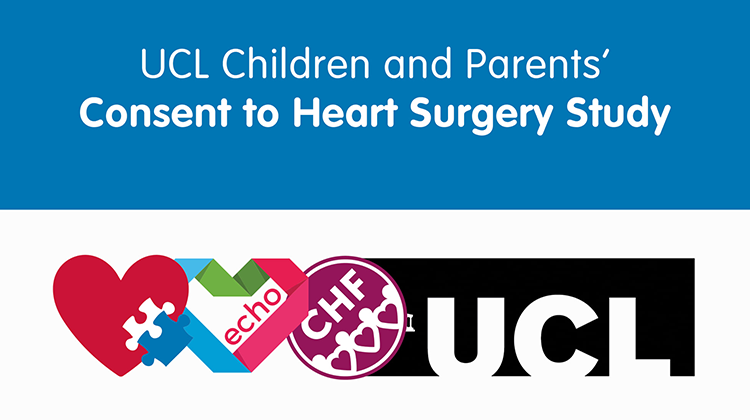Children’s and Parents’ Consent to Heart Surgery – University College London

Children’s and Parents’ Consent to Heart Surgery Research project 2019-2021, September 2021
Thank you very much to everyone who helped with our research from Priscilla, Rosa and Katy at University College London. Here is a short report for the children, young people and parents who helped us. Please let us know if you would like to have more details.
What was the research about?
The main question was: How are young patients aged 6 to 15 years having non-urgent heart surgery informed and involved in deciding about their care?
Sixteen families let us watch some of their care before and after their heart operation, and most of them took part in interviews at Great Ormond Street and the Evelina Children’s Hospitals. After COVID-19 arrived, we had to find other ways of meeting with many of you. This also involved some young people aged up to 17. Lexie at Little Hearts Matter, Sam at ECHO, and Joanna at the Children’s Heart Federation kindly invited some of their members to take part in our online survey; 15 children and young people aged 6-17, and 23 parents sent their replies.
Sam also sent some questions by email, and Lexie held a mobile phone text discussion group. Sam contacted nine children aged 6 to 13 with help from their parents. Lexie involved seven young people aged 14 to 17.
We are so grateful to all of you who kindly shared your views with us.
We also interviewed 45 doctors, nurses, play specialists, psychologists and other experts, and we read many reports and books about other research on children’s consent.
What did the research find?
In the two hospitals, we saw the help given to children and young people before their operation when they did not want to have blood tests, or the anaesthetic injection or mask. Most of them wanted to have the operation, to improve their health or prevent future problems, but many were afraid of the needles and masks.
Twenty years ago, and still today in some hospitals, these would be forced onto resisting children. The doctors and nurses are now keen to help them to know why they need the needles or mask, and how to cope so that they feel less fear and pain. The staff say that it is vital for everyone who needs life-long heart care, to be able to trust their doctors and nurses, and not be afraid when they need treatment. In other words, the doctors and nurses respect young patients when they give their consent (accept the treatment) and when they refuse it (such as turn away from the mask). And they involve play specialists and psychologists in helping to inform and support young patients.
In rare cases, doctors respect children who refuse surgery. They talked of the example of a child aged from about 6 years who needs a heart transplant. After weeks to talking together, if the child still does not want a heart transplant, then they will not have one unless they change their mind. This is because the transplant can only work well when the person with the new heart takes great care of it, with daily medicines and other routines for all the years ahead.
The 45 professionals’ interviews were very useful about the high standards they aim for. The interviews with children, young people and parents were very useful on the benefits of their treatment, and also the serious problems many of them faced such as cancelled operations. Young people talked about their range of needs. Some wanted extra help, others said they did not. Some welcomed moving to adult services, others were less sure. Some had mainly good memories of their time in hospital, others remembered being very afraid.
What will happen to the findings?
We have hundreds of pages of notes and of the recorded interviews. These are all kept private, and anonymous. We are writing reports based on the research for medical, nursing, psychology and ethics journals.
Our main aim is to promote the high standards of respect for children and young people, when informing them and respecting their consent or refusal, instead of frightening them and forcing treatment on them. We are keen to show the high standards at Great Ormond Street and the Evelina Children’s Hospitals. These are still not widely reported in professional journals. Instead, doctors and lawyers tend to agree that young people cannot give consent until they are at least 12, 14 or 16, and they cannot refuse until they are 18. This does not help doctors and nurses, who do not yet respect children, to improve the care they give.
Forty years ago, most hospitals refused to let parents stay overnight in children’s wards. Parents could only visit for an hour or two each day, and usually not at all on operating day. Today everyone agrees that of course families should be together in hospital, as much as they want to be.
In the same way, we hope that soon everyone will agree that children should be informed, and their informed consent or refusal should be respected, as much as they need and want to be. We hope our research reports will help towards these changing views.
Details about the research, the plans and methods and reports, are on the project websitehttps://www.ucl.ac.uk/ioe/departments-and-centres/centres/social-science-research-unit/consent-and-shared-decision-making-healthcare/heart-surgery.
For further information please contact Priscilla, p.alderson@ucl.ac.uk
Professor Priscilla Alderson, Dr Rosa Mendizabal, Professor Katy Sutcliffe,
Social Research Institute, University College London
September 2021.